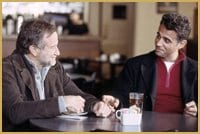In an attempt to appeal to as broad an audience as possible, “The Night Listener” is billed as a psychological thriller when really it’s a story of a gay man torn between the man in his life and a boy who might be.
Robin Williams plays Gabriele Noone, host of a late-night radio serial called The Night Listener. He befriends Pete (Rory Culkin) an elusive teenager with AIDS and a book deal. When Noone’s lover, Jess (Bobby Cannavale), eventually questions whether or not Pete actually exists, Noone goes off in search of the boy.
While the movie does not try to hide the fact that Noone and Jess were once lovers, it’s hard to picture Robin Williams having sex with Bobby Cannavale from Will & Grace. Then again, it’s hard to picture Robin Williams having sex with anyone.
In one unintentionally funny scene, Williams scares the living daylights out of a bald kid in intensive care. It’s hard to tell if the kid was screaming because there was a strange man in his room or because he thought it was Patch Adams. Magically, the entire hospital is alerted to the fact that there is a homosexual roaming its halls and Williams is beset upon by the same search party that chased ET back to his spaceship, only Williams gets Tazered.
Despite the appearance of a boom mike in a couple of shots, the movie does eventually find its footing. It turns the corner once Noone, in search of Pete, encounters Donna, the boy’s adopted mother, who may or may not have invented Pete. Played by honorary gay person Toni Collette, Donna is the most fully realized character in the film; you’re not sure whether to hate her or pity her. This is also a point in the movie where everything starts to look and sound like Fargo.
The film is an adaptation of Armistead Maupin’s book of the same name and, with Terry Anderson, Maupin co-wrote the screenplay.
The story is based on true events as described in Tad Friend’s 2001 New Yorker Magazine article, Virtual Love. In the ’90s a young man named Tony Johnson developed intense telephone relationships with such luminaries as Paul Monette, Mr Universe Bob Paris, Fred “Mister” Rogers, and Maupin himself. Tony’s story of child sexual abuse, and his infection with the AIDS virus as a result of it, was featured in Newsweek and on an ABC special hosted by Oprah Winfrey. But for all his notoriety, no one had actually met Tony in person. Maupin’s queries into his identity would cost Tony a six-figure deal with HBO.
Maupain’s book is intensely personal, probing deeper than the movie into the collapse of the relationship between Noone and his lover. In the book it’s Noone’s reluctance to participate in S&M that drives a wedge between them, while in the movie Jess enjoys a second chance at life after protease inhibitors control his HIV disease. But, Bobby Cannavale with AIDS is a bit of a stretch. Instead of lypodistrophy, the side effects of his inhibitors are a chiseled jaw, great hair and a tan.
We are given a glimpse of what it is like to be a gay icon when an airline steward thanks Noone for everything he’s done “for us” but that’s about as close as we are allowed to get to him.
Another element of the book disappointingly missing from the movie is a melancholic sense of humour.
There is a lovely moment about halfway through the film where all of Noone’s narratives blend into each other carrying the audience along in a limbo of storytelling. That sensation comes to an abrupt end when the movie tries to attach an element of risk to the story. It doesn’t race to a thrilling conclusion so much as leave you there and drive off. Then, to give it that extra bit of gravitas, you are again reminded the story is based on true events. If nothing else, The Night Listener is timely in these days of fake memoirs and baby Suris.
“I’ve spent years looting my life for fiction,” Noone says at the beginning of the film. “Like a magpie I save the shiny stuff and throw away the rest.”
In the case of this movie, Maupin has confused action for the shiny stuff and thrown away the intimacy that made the book a compelling read. The Night Listener is best seen having read the book, but it makes for an interesting mind-fuck either way.

 Why you can trust Xtra
Why you can trust Xtra


